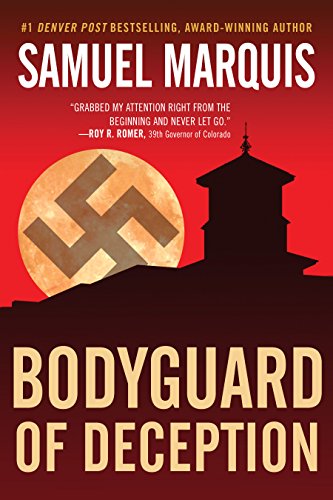
In a foreword, Samuel Marquis opens his historical novel Bodyguard of Deception with the assertion that the book “is the story of Operation Cheyenne precisely as it happened during the Second World War and has been concealed for the past seventy years by the U.S. and British governments.”
This operation, which according to the author unfolded between May 24 and June 6, 1944, involved the theft by German spies of the Allies’ most closely guarded wartime secrets. (As anyone with a modicum of historical knowledge will know, those were the days leading up to the fateful Normandy landings that set the Allies on the road to the annihilation of Nazi Germany.)
Marquis even cites specific recently declassified documents with lengthy filenames that have the ring of authenticity. Yet the events as he describes them in the novel stretch credulity to the breaking point: the coincidences are jaw-dropping. And they never happened. Google Operation Cheyenne. You won’t find anything.
When I finished reading the book, those seemingly impossible coincidences forced me to rush to the author’s note at the end. There, Marquis writes that “more than fifty historical figures populate the pages of Bodyguard of Deception.” He then precedes to list them individually. Some of those listed do not appear as characters in the book. (They’re simply mentioned in passing.) But the main characters whose interrelationships give rise to the coincidences that bothered me are not included in that list. In other words, the story as Marquis tells it simply didn’t happen. He even admits in the end that “the novel is ultimately a work of the imagination and entertainment and should be read as nothing more.” In other words, this is not historical fiction.
Bodyguard of Deception by Samuel Marquis ★★☆☆☆
Oh, more thing: this tale of World War II espionage rests on the successful infiltration of a German spy in England in 1944, where he is shown to have stolen the Allied plans for the invasion of Normandy—among other closely guarded secrets. To the best of my knowledge, that never happened. Accumulated evidence over the years, as memoirs have been written and historical documents declassified, indicates that the British captured and turned every single German spy sent to the United Kingdom. And the FBI captured every German spy operating within the United States during the war.
In other words, I feel cheated. I could have done without that bogus foreword—or those exceedingly unlikely coincidences that any self-respecting novelist should be ashamed to concoct.
Furthermore, the book is not well written. The narrative is awkward at times, and the dialogue forced. There is a scene toward the end of the book in which Adolf Hitler is portrayed in a way that history doesn’t support. Literature, this isn’t.
So, why didn’t I give up in disgust somewhere in the middle of the book as those improbable coincidences began to appear? I was sorely tempted, again and again, but I soldiered on in the belief that Marquis was describing actual events. And, the book’s abundant flaws aside, the action is propulsive. Marquis tells a suspenseful story. If that’s enough to induce you to read the book, have at it. But don’t expect to learn anything about the history of World War II espionage.
For related reading
There are many better novels on the same subject that are solidly grounded in historical fact. Check out 20 most enlightening historical novels. And if you’re looking for exciting historical novels, check out Top 10 historical mysteries and thrillers.
You might also be interested in Top 10 great popular novels.
You might also enjoy my posts:
- Top 10 mystery and thriller series
- 20 excellent standalone mysteries and thrillers
- 30 outstanding detective series from around the world
- Top 20 suspenseful detective novels
- Top 10 historical mysteries and thrillers
And you can always find my most popular reviews, and the most recent ones, on the Home Page.


























